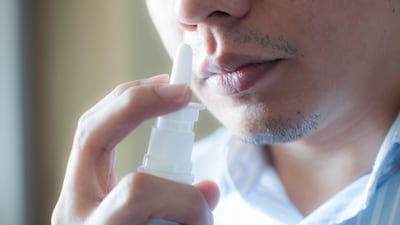A "second generation" of Covid-19 vaccines are undergoing clinical trials, raising hope that nasal sprays and oral medicine could be used alongside shots to tackle the disease.
The World Health Organisation's chief scientist, Dr Soumya Swaminathan, said the new types of vaccine could have advantages over the current crop because they would be easier to deliver than injections and could even be self-administered.
More than 50 per cent of the world's population has received at least one shot of a Covid-19 vaccine so far.
Dr Swaminathan said 129 different potential vaccines have reached clinical trials, when they are tested on humans, while a further 194 are still being worked on in labs.
"This covers the entire range of technologies," she told a live interaction on the WHO's social media channels.
"They're still in development. I'm sure some of them will prove to be very safe and efficacious and others may not.
"There could be advantages to some of the second-generation vaccines. Clearly, if you have an oral vaccine or an intra-nasal vaccine this is easier to deliver than an injectable.
"Ultimately we'll be able to choose the ones that are most appropriate.
"If not for Covid, we're going to use these platforms for other infections in the future."
She said there were advantages to spraying medicine into the nose, as happens in some countries with influenza vaccines.
"If there's a local immune response then it will take care of the virus before it even goes and establishes itself in the lungs and starts causing a problem," she said.
There have been concerns that the initial immunity against Covid-19 created by the first vaccines is waning, with some countries introducing booster programmes.
Health workers in England will have to be vaccinated against Covid-19 by April 1 to keep their jobs and over-65s in France will need to show proof they received a booster shot to visit restaurants, attend cultural events and travel on intercity trains.
Meanwhile, Germany's vaccine advisory committee has recommended that people under 30 are inoculated with the Pfizer-BioNTech shot.
The committee said a lower number of heart inflammations was reported in young people who received the shot, compared with those who had the Moderna vaccine.
Drugmakers Pfizer and BioNTech announced on Tuesday that they formally submitted a request for the US to approve emergency use authorisation of their booster vaccine for people aged 18 and older.
The WHO has only given emergency use authorisation to seven Covid-19 vaccines – those developed by Pfizer/BioNTech, Moderna, AstraZeneca, Johnson & Johnson, Sinopharm, Sinovac and Bharat Biotech.
"Nobody has ever claimed that the vaccines are going to be 100 per cent protective. But 90 per cent is a wonderful amount of protection to have, compared to zero," Dr Swaminathan said.
"Until now, with the vaccines that we have approved, there has not been any signal which has been so worrying that we need to say, well, we need to re-think this vaccine."
More than 7.25 billion vaccine doses have been administered around the world so far.


